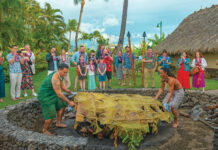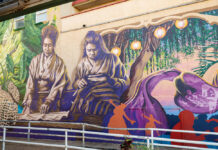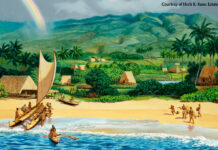Story by Jill Engledow | Illustrations by Matt Foster | Photographs by John Giordani

On the eastern end of Maui, past Hāna, near Kōkī Beach, stands a cinder cone called Kaiwiopele. Long ago, when Pele was still a mortal woman, she left her home in the South Pacific, fleeing the wrath of her older sister, the sea goddess Nāmakaokaha‘i. Reaching the Northwestern Hawaiian Islands, Pele used her magic stick to dig in search of her beloved fiery lava. But the angry sea goddess drowned the flames, forcing Pele to move from one island to the next in search of a home. Nāmakaokaha‘i followed, quenching the fire in each pit Pele dug.
Finally, on Maui, Nāmakaokaha‘i caught and defeated her younger sister, tearing her to pieces. But instead of destroying her, Pele’s dismemberment transformed her into Hawai‘i’s volcano goddess. Her spirit rose and traveled to Hawai‘i Island, where she made a home in Halema‘uma‘u Crater. At last, seeing her sister’s spirit above the crater, Nāmakaokaha‘i relented. Although she visits other islands, Pele still lives in the active caldera Halema‘uma‘u. And on Maui, the site where Nāmakaokaha‘i had tossed her remains became known as Kaiwiopele—“the bone of Pele.”
Place names in Hawai‘i often carry rich cultural or historical meaning, but rarely is the origin story as clear and well known as the legend of Kaiwiopele. The mysteries behind many place names cause long-running debates among scholars. For example, Hawaiian-language experts agree: Wailuku means water (wai) of destruction (luku). But did battles or floods cause the destruction? That’s where opinions diverge.





